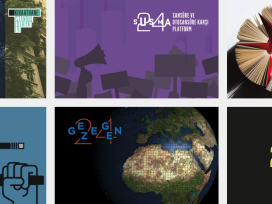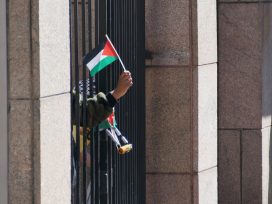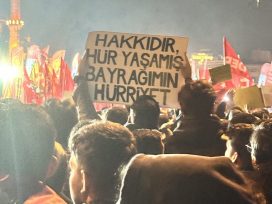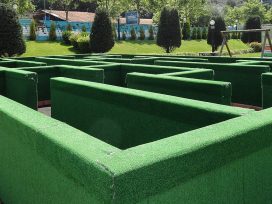Hundreds of thousands of protesters in the streets of Istanbul. Tens of thousands of policemen attacking with teargas bombs and rubber-bullets. The Bosphorus bridge heaving with demonstrators. Solidarity meetings all over Turkey and beyond. A government that seems to have lost touch with events on the ground. An establishment media whose patrons have been bullied not to report what is in front of its eyes. A nation in turmoil. A prime minister, who in 2011 was lecturing Hosni Mubarak about democracy and divine justice – and who was re-elected then with a massive popular vote – who now looks awkwardly like the former Egyptian dictator. All this has thrown Turkey into its deepest crisis for more than a generation.

Turkey seems among the unlikeliest candidates for a popular uprising. It has one of Europe’s few thriving economies, with record growth, falling unemployment and decreasing urban poverty. The country’s technical infrastructure was never as advanced, its people never as educated, its society never as broadly middle class as it is now. A peace process in Kurdistan promises a new deal with the country’s largest and most brutally oppressed minority after decades of war. The socio-economic factors which drove people in Egypt, Tunisia, Greece and Bulgaria to the streets are largely absent. Despite all this, a small protest in the Gezi Park of Istanbul’s Taksim Square quickly turned into an enormous eruption of protest.
So why Turkey, and why now?
The background
On Wednesday 29 May 2013, a small group of students and ecologists tore down the barriers to occupy the Gezi Park adjoining Taksim, the most symbolic of Istanbul’s central squares. Their declared aim was to stop developers from building a shopping-centre that was to be housed in a replica of a military barracks building demolished sixty years ago – resulting in the destruction of much of the park. The group attracted support from intellectuals and politicians, notably the pro-Kurdish socialist MP Sirri Süreyya Önder.
The event was completely peaceful, but the police response to activists was, by any measure, disproportionate. Their repression initially forced the protesters out of the park, but caused wide public outrage. Soon, mobilized by social media, they were back – and in hugely greater numbers. By Friday 31 May, tens of thousands were clashing with police units in different Istanbul neighbourhoods, while clouds of teargas darkened the skies. Police units threw gas-bombs and teargas into metro-stations, hotel-lobbies and residential buildings. By midnight, protesters had retaken the park, even as street-fights continued and spread to many, mostly middle-class, suburbs. Hundreds of protestors were wounded and hundreds more taken into police custody. Clashes intensified on Saturday and spread increasingly around the country.
On Sunday afternoon, all police units suddenly withdrew from Taksim Square and Gezi Park. Since then, the only evidence of their presence is a few burned-out police-vans. By Monday, the police also withdrew from the Dolmabahce area and from Besiktas, home to prime minister Recep Tayyip Erdogan’s Istanbul office as well as to its most politicized and daring football-supporters’ group (called Carsi). As of Monday night, 3 June, and after two confirmed deaths, the police had either completely evacuated or settled for less brutal policing strategies.
The context
What, beyond their immediate spark, has motivated the protests? At least three interrelated factors have incubated them:
– an increasingly uninhibited neoliberal development process
– the government’s growing conservative zeal
– a troubled foreign policy
These three factors come together in a further overarching source of discontent: with the prime minister’s authoritarian style of government.
A neoliberal restructuring
The ruling AKP’s political success in the decade since it came to power in November 2002 owes much to its balancing-act between neoliberal readjustment and the extension of welfare, health and educational provision. As a result, a large section of Turkey’s society has gained access to better public services. At last, though, the AKP and its leading cadres have succumbed to the logic of neoliberal capitalist exploitation, and this is shredding their reputation among many Turkish citizens.
For example, hundreds of hydroelectric power-plants are being built in Turkey’s mountainous regions, against the will of local people. Most of them are based in very diverse and delicate ecosystems, and their construction is destroying the forests, the fauna, the flora and the cultural geography of these places. Local protests by steadfast villagers intent on defending their territory have been brutally treated by police and gendarmerie, who behave as if they are the private army of construction companies (which often have links to the family of senior government members). Some villagers have succeeded in fending off the construction, even in the face of this treatment and hundreds of court cases brought against them; others have joined documentary filmmakers and environmental activists to tell their stories of resistance to the privatisation and appropriation of their common goods. Many of the latter were at the initial demonstration in Taksim.
The neoliberal boom has been felt particularly in Istanbul, where a process of massive urban regeneration and dispossession is in evidence. Entire neighbourhoods housing the urban poor have been cleared of their former residents in opaque planning processes by the municipality and large construction companies (again, close to the government).
Tarlabasi, for instance, was an impoverished but cosmopolitan neighbourhood close to Taksim, that gave shelter to what the municipality considered as “marginal groups”: Kurds, transsexual sex-workers, African immigrants. Most have now been driven out of their crumbling 19th-century houses into suburbs several dozen kilometres away from their workplaces to make way for inner-city luxury apartments. The century-old Roma settlement of Sulukule was cleared in the same way, destroyed and completely rebuilt by private developers. This policy of state-led dispossession – not limited to Istanbul – is now being repeated in all major Turkish cities.
Even more daunting are the new megaprojects, which have become synonymous with their greatest proponent, Erdogan himself. They threaten to destroy a substantial part of the city’s forests on its northern fringe. These include a third Bosporus bridge, Europe’s largest airport (with a capacity of 100 million passengers), and a canal planned to connect the Marmara Sea and Black Sea, which will have serious and probably irreversible effects on the marine ecosystem. The government has pushed these projects through without either public consultation or environmental-impact assessments, leaving many Istanbulites with the feeling that their city has turned into a massive rent-generating machine.
A conservative project
Even as Istanbul’s built environment is being reshaped, the government has imposed socially conservative and religiously inspired policies that have shattered any pretence of secular politics. A school reform has increased the number of required religion classes and forced many pupils to attend religious schools, often against the will of their parents. The right to abortion has been curtailed, while social policy has increasingly focused on increasing birthrates and recasting women as dependent mothers rather than as equal individuals.
A law pushed through parliament recently has introduced severe restrictions on the promotion and sale of alcohol, in addition to already heavy taxes. The prime minister has intervened directly to ban the sale and consumption of alcohol on university campuses and ensured that open-air drinking in the centre of the city’s nightlife has become close to impossible.
An unstable foreign policy
It is not long since the government was promoting the idea that Turkey is the new hegemonic actor in its neighbourhood. A series of setbacks, especially in its Syria policy, has exposed this as an illusion. Turkey has broken all its links with the Syrian regime and become both a leading supporter of foreign fighters there and a conduit for weapons entering Syria. In backing the largely Sunni opposition, the language of Turkey’s foreign policy has taken a sectarian turn, thus upsetting many non-Sunni Muslims and non-religious people in Turkey.
Turkey’s humanitarian aid for Syrian refugees has been exemplary, but its porous borders and the safe passage it has granted to transnational jihadists has put the border province of Hatay at serious risk. The bomb-attacks on 11 May in the town of Reyhanli, which killed at least fifty-one people, leave little doubt that the government’s Syrian policy is spiralling out of control.
These three factors are alienating enough to many Turkish citizens. But an additional one makes them even more irksome: the autocratic manner and language of an unbearably arrogant and self-aggrandising prime minister.
A review of Erdogan’s speeches and statements since his last election victory in 2011 suggests a near-delusional worldview. “Women should have at least three children”…”Abortion is murder”…”The Sunnis of Syria are our brothers” (implying that the Alawis are not)…”We want a pious youth”…”Alcohol is destructive”…”Zionism is a crime against humanity”. Millions of Turks – at least the 50 per cent who did not vote for the AKP – feel that this is not the man to become the country’s first elected president, the top position Erdogan has announced as his personal-political goal. But even within the electorate of the AKP, dismay is rising.
The protesters
It was young ecologists who began the occupation of Gezi Park. They were soon joined by students, middle-class professionals and left-wing political activists. Over these days, pretty much everyone who has not voted for the AKP – and even some who did – has come to Taksim. In terms of symbols, probably the most visible now are a variety of left-wing organisations, as well as ecological, LGBT and feminist groups. In terms of numbers, students and professionals as well as fan groups like Carsi are the most important constituents. Many trade unions and most professional organisations have shown support, the latter playing a major role in organising legal and medical aid for affected protesters.
The main opposition Republican People’s Party (CHP) also welcomed the protests, and eventually even individual members of the right-wing Nationalist Action Party (MHP) joined in. The Kurdish organisations were at first reluctant to join, probably alienated by the increasing numbers of Turkish flags and slogans (including, among some groups, “We are all Ataturk’s soldiers”) and concerned that the protests might derail the peace process. Nevertheless, Kurdish organisations also entered the square in the end; by late on 3 June, all of these groups were demonstrating (and drinking) peacefully at Taksim. Without the cops, one protester said, we are much better off.
The future
The events in Taksim have a striking resemblance to the “Republic of Tahrir”. The immediate outpouring of support and solidarity; the makeshift emergency treatment centres for the wounded that emerged overnight; the involvement of the bar association and individual lawyers; the provision of food (and the essentials of fighting teargas – lemons, milk, water, gas masks and construction helmets) by many schools, hotels and restaurants. Soon, these services were also provided by private entrepreneurs, who completed Taksim’s social infrastructure. The buildings around the square were adorned with graffiti; hundreds of slogans ridiculing Erdogan were chanted; the rock group Duman even released a protest song.
Yet, Turkey is not Egypt and Erdogan is not Mubarak. Despite the police brutality, the city did not come to a standstill; protesters were able to cross the barriers and go home to get some rest; the boats, buses and metro services continued to run. Eventually the police withdrew and violence subsided, and the news blackout was lifted after the intervention of President Abdullah Gül.
Turkey is still a democracy and this protest is not about regime change. It is an explosion of discontent with a leader who has done a lot of good for the country, but who has become arrogant, out of touch, shielded from society by second-rank advisers, and unable to listen to anyone who disagrees with him. Erdogan’s charisma is now significantly damaged and his chances of becoming Turkey’s president are diminished.
If President Gül and the more independently minded members of the government show that they take the protesters, and the “other 50 per cent” of Turkey’s population seriouslly, then the protests that began in Taksim Square will enter the annals of Turkey’s history of the struggle for democracy and human rights. They will be recorded as the country’s first urban movement, whose most visible symbol is a beer bottle.
To achieve this, the government in Ankara – now intent on damage control – will have to move. On 5 June, deputy prime minister Bülent Arinc meets members of the Taksim Platform which represents the protesters. The changes sought by the demonstrators include a repeal of the plan to build a shopping centre; a withdrawal (or an agreement not to enforce) the law on alcohol consumption; a review of the most extreme excesses of neoliberal urban and economic policies; due process for the investigation of police brutality (and particularly for at least one case of possible murder by a member of the police force); and an assurance that a societal project rooted in Islamic conservatism will not be imposed.
All this is possible, though probably not under prime minister Erdogan, who seems to have passed the zenith of his power. If these measures are not conceded the protests will continue, with the risk they become vulnerable to provocation by non-democratic groups, and of more lives being lost. In that case Turkey will enter another period of polarisation, uncertainty and decline. The stakes are high. But there is now also a prospect for a better, more inclusive democracy in Turkey.







